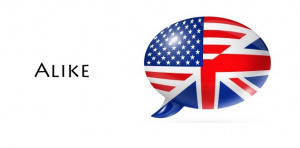Difference between revisions of "Language/English/Vocabulary/Alike"
< Language | English | Vocabulary
Jump to navigation
Jump to search
m (Quick edit) |
|||
| Line 17: | Line 17: | ||
*He’s got two very similar-looking daughters. (not alike daughters) | *He’s got two very similar-looking daughters. (not alike daughters) | ||
==Related Lessons== | |||
* [[Language/English/Vocabulary/Healthy-Habits|Healthy Habits]] | |||
* [[Language/English/Vocabulary/Airport|Airport]] | |||
* [[Language/English/Vocabulary/Prefixes-and-Suffixes|Prefixes and Suffixes]] | |||
* [[Language/English/Vocabulary/Although,-though,-but-and-however|Although, though, but and however]] | |||
* [[Language/English/Vocabulary/Commonly-Confused-Words|Commonly Confused Words]] | |||
* [[Language/English/Vocabulary/Differences-between-'To-marry'-and-'to-get-married'|Differences between 'To marry' and 'to get married']] | |||
* [[Language/English/Vocabulary/As-usual|As usual]] | |||
* [[Language/English/Vocabulary/Not…as-such|Not…as such]] | |||
* [[Language/English/Vocabulary/Phrasal-verbs-with-out|Phrasal verbs with out]] | |||
* [[Language/English/Vocabulary/Along|Along]] | |||
Revision as of 16:06, 26 February 2023
Alike
1. The adjective alike means ‘like each other’
Compare:
- The two boys are alike in looks, but not in personality.
- He's like his brother, (not He’s alike his brother.)
2. Alike is not often used before a noun.
Compare:
- His two daughters are very much alike.
- He’s got two very similar-looking daughters. (not alike daughters)
